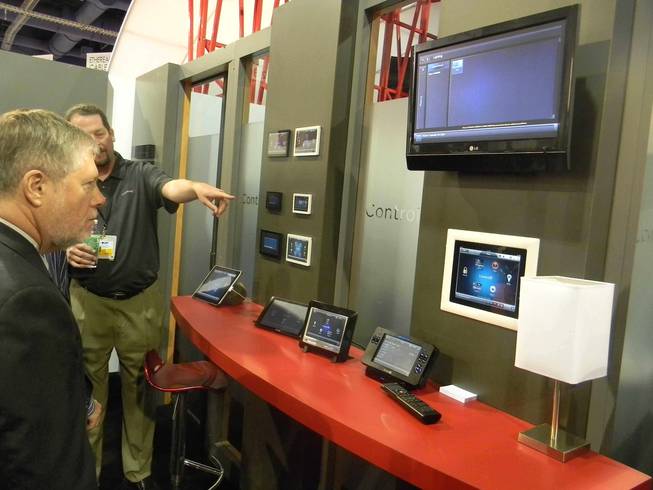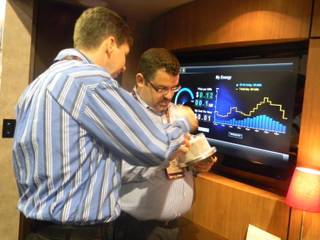
Control4, software that allows consumers to program all of their appliances and home entertainment systems, on display at the Consumer Electronics Show on Saturday.
Saturday, Jan. 8, 2011 | 8 p.m.
Beyond the Sun
One day very soon, a person might wake up to an alarm set the night before and, instead of groggily searching for the light switch, grab a tablet computer, a smartphone or a TV remote, press one button and the bulbs will brighten to the most energy-efficient setting.
Instead of fiddling with an iPod or radio, the home entertainment system would automatically select an easy-going track — maybe some light jazz — to welcome its owner to the morning, perhaps transitioning to a news broadcast after a few minutes. At the same time, the thermostat adjusts, maximizing savings on the utility bill.
That was the future described by executives from leading home entertainment and lifestyle technologies companies during a panel discussion, "2011: Year of the Connected Home," at the Consumer Electronics Show on Saturday at the Las Vegas Convention Center.
These technologies might already be for sale at your local retailer. But the experts agreed that their mass adoption by average consumers would require education and a clear explanation of their benefits — something that seems to be lacking in the current marketing schemes.
In a conversation led by Jason Knott, the editor of CE Pro magazine, Christopher Albano, senior director for home networking at Comcast; Daniel Marotta, executive vice president for Broadcom; David McCalpin, general manager for home energy management at GE; Neil McPhail, senior vice president for emerging business at Best Buy; and Will West, CEO of Control4, analyzed the challenges facing the implementation of "connected home" technology and the outlook for its expansion in the coming year.
What is a "connected home"? The image that emerged during the hour-long conference centered on management and convenience.
Using a tablet computer, a smartphone or a remote control, consumers could manage all aspects of their home from one central station — including thermostats, appliances and home entertainment systems. It would be possible to monitor your energy use throughout the day and program your air conditioner, refrigerator or washing machine to run when rates are at their lowest. By pressing one button, the TV would switch to the proper input, the surround sound would kick in, the lights would dim and a movie would begin.
"It changes the way you begin your day...The day is a completely different experience, because the systems in your home are working together," said West, whose Control4 software is one of the first to attempt to integrate control of all aspects of one's home into a single program. Its "home automation" software is being installed in more and more home appliances and electronics, he said.
With utility companies moving toward tiered rates, coupled with the "ride-along benefits" that simplify people's lives, McCalpin said, connected homes "enhance lifestyles."
General Electric's smart appliances are capable of communicating with the power company's grid to adjust its energy use during peak hours. The company introduced smart appliances in 2009 and McCalpin said almost all products coming out of the factory are equipped with some kind of smart technology.
Consumers, for the most part, have been slow to jump on the seemingly endless possibilities presented by a connected home, as two issues — cost and complexity — are routinely raised. In 2011, though, West said, the technology will likely be recognized on a mainstream level — Control4 has about 1,600 dealers nationwide. By 2012, it might become a dominant presence.
"This year, you're going to the see the obviousness, but it won't be until 2012 that you'll see it in millions of homes," he said. "But it's certainly happening."
At Comcast, which recently launched its first iPad application, Albano said the cable provider is pushing home connectivity for new and renewing customers. The trick, though, is selling the technology's benefits and its simplicity to a diverse group of customers. As the executives repeated throughout the discussion, that communication depends on each individual's situation and geography.
Much of the responsibility for educating the masses lies with providers like Comcast or retailers like Best Buy, said McPhail, who added that he's been working on home networking projects for a decade. It is their role to familiarize consumers with the technology, he said, but all the companies within the connected home "ecosystem" have to cooperate.
"That's why Best Buy exists: to educate in the art of the possible, in a way that you can experience before you buy," he said. "Until the experience exceeds the complexity and cost, adoption remains low. What we aspire to do is to be able to show you what the possibilities are."
At the moment, there are good signs for the future of connected homes. The markets for tablet computers — such as the iPad or the Motorala Xoom, which won Best in Show at this year's CES — and smart TVs seem to be blossoming.
The ISI group, a Wall Street research firm, has estimated that 50 million tablet computers will ship in 2011, and that number will nearly double to 92 million in 2012. Samsung announced at its CES keynote address that its goal was to sell 12 million smart TVs by the end of the year.
In the meantime, Marotta said, home connectivity will push forward with its "continuous evolution" while edging into the mainstream market in 2011.
"This is a connected world," McPhail said. "We're going to have to collectively come together and take some of that complexity out of it and tell a cohesive story about the benefits of connecting your lifestyle."


Join the Discussion:
Check this out for a full explanation of our conversion to the LiveFyre commenting system and instructions on how to sign up for an account.
Full comments policy